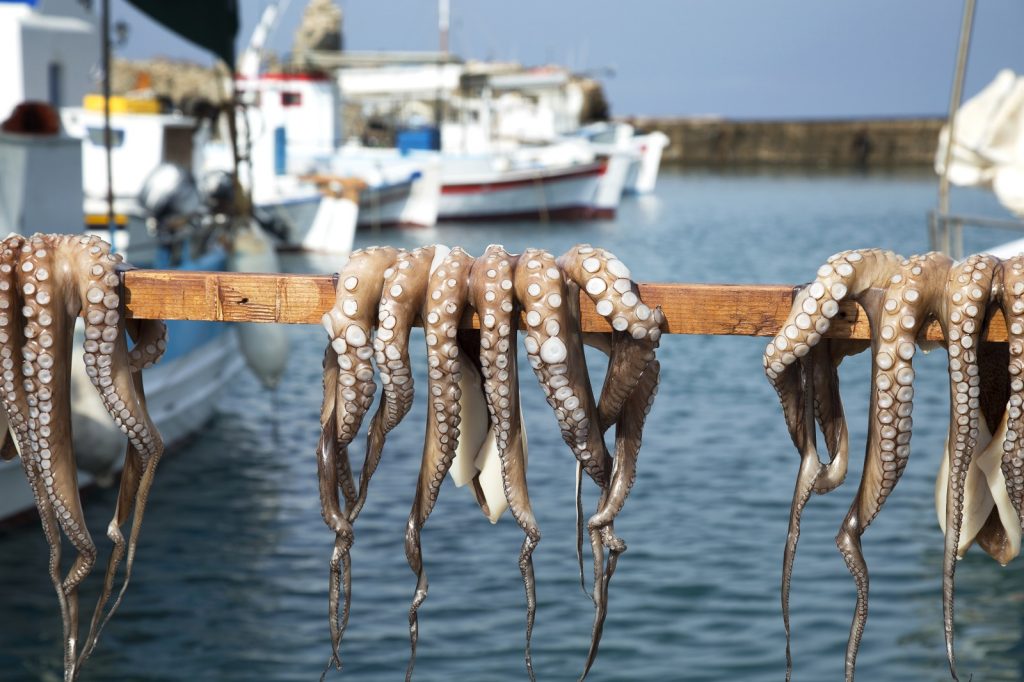Watching an octopus hanging out of a tavern in Greece is one of the iconic photos -at least for me- of my country during summertime. The bigger it is the better chances this tavern has to convince to go and sit in one of its tables.
Eating an octopus in any different way its one my favorite dishes during summer. However, it is also one of the most difficult to cook especially if you decide to grill it or boil it. If you over do it , then it might be too hard, or too chewy and miss the opportunity to enjoy one of the best dishes in Greece.
My initial inspiration about this post was the following post on Instagram where it shows this chef cutting down a huge octopus.
Cooking an octopus might seem as something really difficult and intimidating for someone that hasn’t done before but it really isn’t. The magnificent octopus measures up to 80cm and has eight succulent tentacles which are each a feast waiting to happen.
In Greece fishermen and generally in the taverns are know to beat the octopus in the rocks before they cook it in order to soften it up. As i read, some chefs also tend to put it in a bag and pop it in a quick spin on the washing machine but i don’t think you should go so far.
Is Octopus Good For you?
Yes, it is! Low fat. Octopus is great because it contains very low amounts of saturated fats.This means that it can be a great option for someone who want to lose weight or someone who just wants to keep being fit.100 grams of octopus has only 160 calories even if it is high in cholesterol.Another advantage is that octopus contains many healthy nutrients.
How you cook an octopus?
Whether you choose a frozen or fresh octopus there are different options but i have to say frozen in this case makes it easier for us. It might seem counter intuitive since with many types of meat and seafood freezing can have a negative effect on both texture and flavor, but with octopus (and squid), that is not the case. Grilling it is also great but my favorite is boiling it.
Fill a saucepan with salted water and bring to the boil. Add the octopus, reduce the heat immediately and simmer gently for 45 minutes. It’s important that the water is turned down to a gentle simmer once the octopus is in the pan. Cooking it too quickly will result in a rubbery texture.
In order to make sure whether it is ready or not use a knife and stick it to the thicker parts of its tentacles. If it is easily pushed inside then its good to go.
However, that is not the only way to do it and many times people prefer it as a pickle. My father certainly does and he has made it many times for me as you can see over here.
How to clean the octopus?
That is what gets everyone scared when it shouldn’t. If your octopus is not pre-cleaned: Wash and clean your octopus, removing the ink sac and internal organs by making a circular cut around the beak with a paring knife and pulling it away (the organs will come with it).
The flavor of the octopus is really delicate and you will need to season it really well and add plenty of virgin olive oil in order to reveal its texture and taste. If you want inspiration try to mix it with pasta and additional seafood but remember always that it is also ideal as a standalone plate.

Whatever you choose you need to remember that eating an octopus is a really tasty experience which should tried more often. Additionally to that, remember, it is one of those seafoods that can last in your fridge a bit more than all the others.
Just don’t forget to drink some ouzo and you should be fine!

